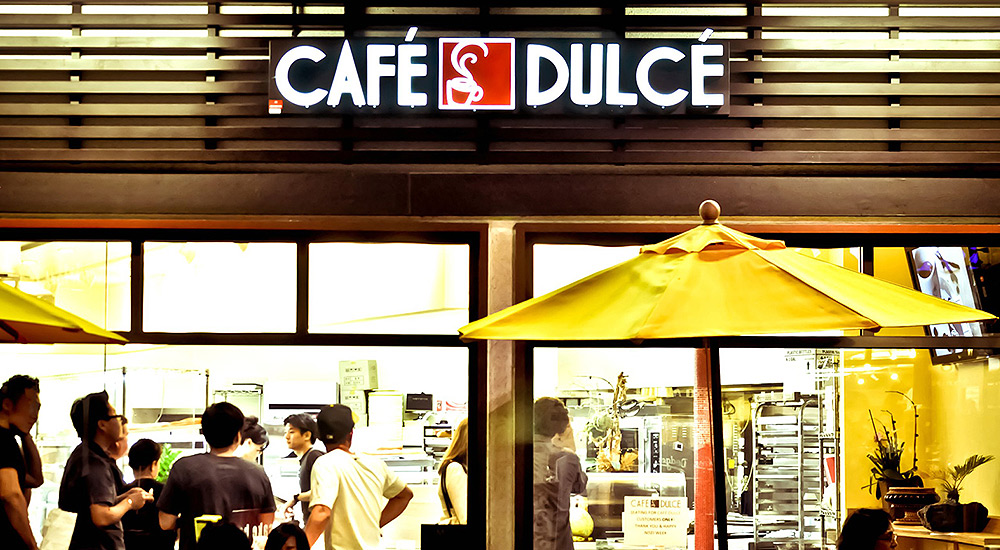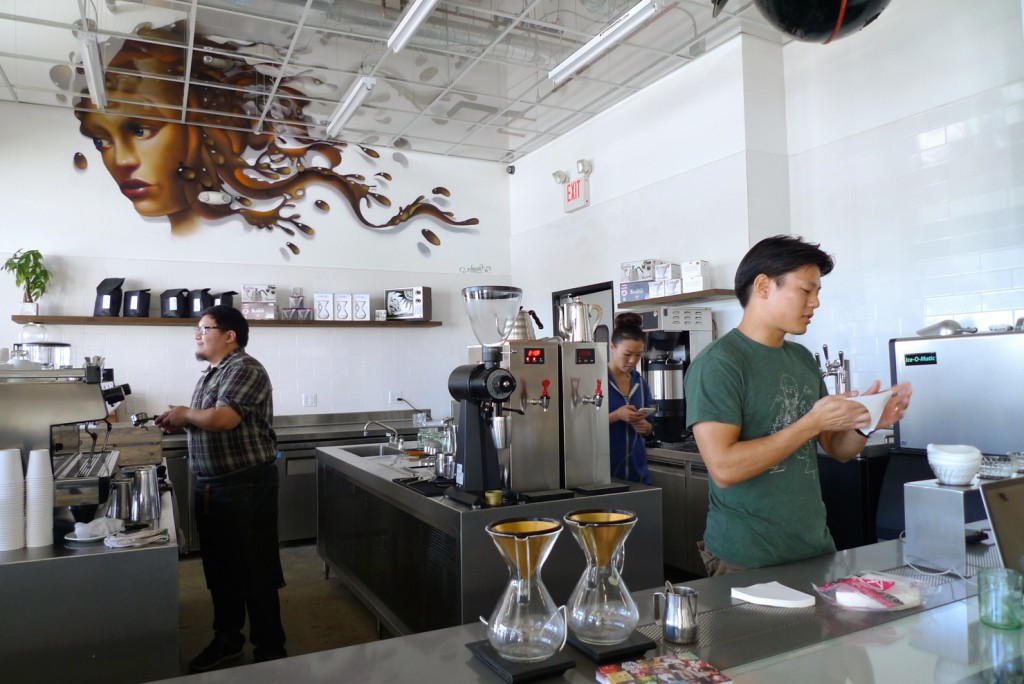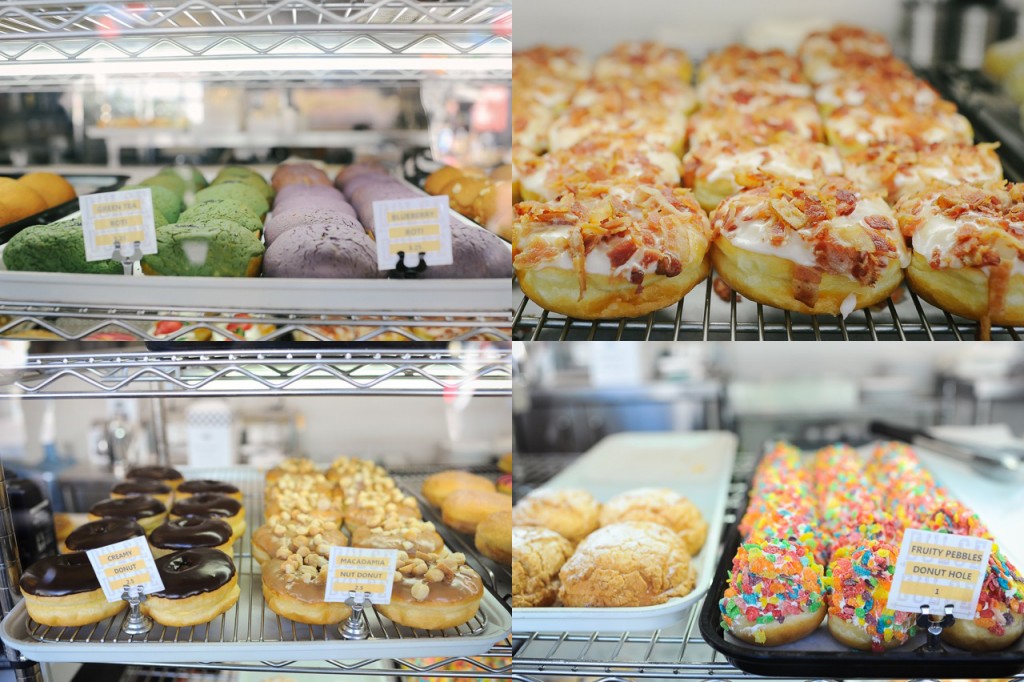Amidst the hustle and bustle of families, tourists, and people on their lunch breaks mingling in the open-air Japanese Village Plaza, I sat down with Café Dulce founder James Choi to learn more about the man who, against formidable odds, built up one of the most popular cafes in Little Tokyo.
Café Dulce boasts a mouthwatering spectrum of in-house baked treats (who doesn’t love a melt-in-your-mouth fluffy green tea donut?), carefully crafted coffee beverages using beans from roasters such as Verve and Heart Roasters, and, best of all, some of the most down-to-earth, all-around-day-brightening baristas you’ll be pressed to find in Los Angeles. After hosting a series of pop-up cafes throughout the rapidly developing downtown Los Angeles, Café Dulce has recently opened up their second brick-and-mortar location this past January in Alameda Square, a stone’s throw from Little Tokyo.
Choi had no idea he would become the mastermind behind one of the most popular cafes in Los Angeles when he went to college. He’d entered the University of Southern California to pursue a career in professional golf, but ended up entering the accounting field through Ernst & Young after realizing that his mother was going through some financial trouble.

“During that time, my mom had been out of work for around 6… 7… 8 years, and she was constantly trying to start businesses. She had worked for the Mirage Hotel in Vegas, when the Mirage was the best hotel, when it was new. So she was the international marketing hostess there, and there was a huge thing that happened where the Mirage used her as a scapegoat. She spent time in jail in Korea… and she was actually in a huge lawsuit with Mirage Resort and the casinos and Steve Wynn and all that stuff,” explains Choi.
“So anyways, that had kept her from working for a long time. And she was like, I want to start a business. So I was trying to figure out what it is that she could do.” Soon after, they opened up Teuscher Swiss Chocolates at the Stanford Shopping Center in Palo Alto.
There was no rest in sight for the both of them. “So for the first year, what I would do is, I’d work Monday through Friday at Ernst and Young, and then fly up to San Jose and drive to Palo Alto on Friday night … work Saturday Sunday, and then fly back down Sunday night and go back to work on Monday… I did that straight for like six months, and did that every other week for another six months,” recalls Choi.
Soon, Choi realized that his mother was really unhappy at the store, and shortly after his grandmother passed away, his mother was diagnosed with ovarian cancer. He needed to get his mother out of there. Teuscher was soon sold, and the money from selling the store went to supporting his mother’s hospital bills and their living expenses.
Choi’s mother was not one to wait around to let life pass her by, however. She told Choi, “I’m not going to wait around and die. I’m going to open up a bakery in Little Tokyo.”
Choi was resistant at first, and for good reasons. First of all, neither he nor his mother had any bakery experience. The chocolate boutique, in contrast, had been a much easier store to operate. All that was required was keeping track of inventory, hiring staff, ordering chocolates from Switzerland, and packaging and selling the chocolates. Café Dulce, on the other hand, has three relatively chaotic operations in a small store: an in-store bakery, a strong coffee culture, and a popular lunch program. “Of course, we weren’t like that when we first opened,” remarks Choi. “But thinking about that sort of thing, a bakery’s not easy.”
On a more personal note, Choi was also hesitant because he knew that his mother’s declining health was heavily interlinked with stress. Choi recalls trying to convince his mother, “Mom, you should just chill. I’m going to work. You don’t have to worry about anything. You just have to relax.”
Upon revealing that she had a baker partner who would be in charge of operation, Choi finally relented, “If that’s the case and that’s going to make you happy, then go for it.”

As luck would have it, however, the partner bailed after a huge disagreement with Choi’s mother, three weeks before the store was set to open. So with no further ado, Choi put in his two-week notice at Ernst & Young and prepared himself to learn how to run a bakery in three weeks.
“When other people say, is there a word of advice… this is not something I recommend for people to do. When I talk to other restaurateurs or people who’ve been in the restaurant business for a really long time, they say that we’re the exception to the rule,” he admits with a laugh. “My mom had $500 in her banking account. We didn’t even have flour to bake with.”
Credit cards were maxed out over the next 6 months and payments were floated with abandon in a desperate attempt to keep the doors open. “So, what are you gonna do? She’s already spent all the money [on building out the store]… If you’ve started something, you’ve gotta at least see it through. You know, sink or swim.” And with that, Choi put his head down and faced the hurricane.
“First year and a half, it was more of, which bill could I pay last?… You quickly realize that the electric company and the gas company, they don’t charge you late fees until they actually come to your store and ask for a check. And they don’t cut your power. So we were… two, three months behind on our electrical bill and our gas bill.” It is hard to imagine that what is now such a thriving café had once been on the brink of existence.
Up and running, Café Dulce is an invaluable pillar of the Little Tokyo community, with Choi as the café’s backbone. Where community comes in, Choi’s dreamer side emerges in full force. Any chance he has to bring the community together, Choi takes initiative.
One idea he has is to turn the Japanese Village Plaza into the “Haunted Village” during the month of October every year with fog rolling in while costumed folks wander around, creating a spooky and festive atmosphere.
“The stage – that’s not being used at all in October. So I was like, let’s turn that into a pumpkin patch, bring a bunch of bales of hay, do face painting for kids, and create an environment for kids to come in and trick-or-treat,” Choi says, eyes glowing. “This year was the closest we got. We got Tanaka Farms to be down to donate a bunch of pumpkins… I think we’re a little bit closer… every time I share this dream with people, everyone gets excited. So I think, one year, before we close down as a shop, we will do this. That’s one way we try to be invested in the community.”
Another idea churning around Choi’s mind is to create an opportunity for a group of young Asian American artists to come together during the month of December to go caroling through the Village. In the winter of 2013, Café Dulce collaborated with the band Run River North, and ended up packing the entire center of the plaza. “I took a picture and sent it to the manager and was like, ‘This is the way the plaza should look. It should be filled with people.’ If there’s a crowd, you’re gonna at least check it out. You’re gonna be like, ‘What’s going on?’ You see these young Asian artists playing really cool music, and you hang out and check it out.”
When the Japanese American National Museum hosted their Giant Robot Biennale 4 in October, Café Dulce was there to support with nifty giant robot donut toppers. Choi describes Café Dulce’s role in the community as, “being not just a business in the community to be in business, but to really spread more awareness about the community… If there’s something going on in the community that we can help out with, we try to do it.”

This mentality translates to each experience Choi wants customers to have at Café Dulce. By spreading goodwill and goodness to each person that comes in, Choi hopes that it’s paid forward in their respective areas of work and community. “We want to change the community and the world, one person at a time. If you come into our store, we hope that you leave happier or at last you feel better about your day after you leave our store.”
“One thing that we always talk about during our leaders’ meeting, is ‘Who is Dulce? What is our Why? Why do we operate?’ A big thing is sure, we sell coffee, we sell donuts, we sell pastries, we have lunch. But that’s what we’re doing. That’s not why we’re doing it,” explains Choi. “There should be a greater purpose, hopefully… I always tell our guys when we’re training someone on bar, we don’t serve drinks, we serve guests.”
In the process of opening Café Dulce, Choi lost his mother after a tough fight against ovarian cancer. “I went through my toughest times here at this store… after we opened this store, she was good for another year, and then the cancer recurred… she was in remission for a year, and then it came back after we opened the store, and she chose not to do chemo until the doctor said she had to, so that was another year and a half or two of fighting for her. And then it was more surgery and more hospice care, and that was tough, and opening the store was really difficult,” explains Choi.
Yet in spite of his rocky past, Choi remains strong, “It really shaped me into who I am today, and it continues to drive the person that I want to continue to be, or become…. I think one of the biggest things that God’s blessed me with, is the ability to just put my head down and be patient… and having an undying optimism that [things are] going to work out.” That undying optimism permeates the operation of Café Dulce, and is clearly evident through the work, soul, and heart Choi pours out into the vibrant Little Tokyo community.
![]()
Cover photo by Amparo Rios